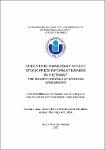| dc.description.abstract | In general, the information integrated in the share price reflects how
efficiently and transparently a stock market may work. Stock price informativeness
(SPI) illustrates the degree in which the firm-specific insights incorporated into price
movements. This is considered a useful rate to evaluate the market’s transparency. My
paper aims to investigate the relationship between State ownership and SPI in
Vietnam as an emerging market. With high State-owned capital, Vietnam should be
an emblematic case study. Besides, as the main problem previously found in low rate
of SPI is the managerial opportunism, I also test the moderating effects of earnings
management (EM) in the influence of State control on SPI.
In this paper, I use the data from 2016 to 2020 of non-financial listed firms
in Ho Chi Minh Stock Exchange (HOSE). Linear regression models are applied to
express the relationships. The result reveals a significantly negative impact of State
control on SPI. Furthermore, by using discrete measures of accrual earnings
management (AEM) and real earnings management (REM), I find that only the
occurrence of REM in State-owned enterprises (SOEs) accentuates the relationship
with SPI, but not AEM. The empirical evidence provided in my study is expected to
contribute to the studies on SPI in emerging markets, SOE’s transparency, and
comparison between the economic implications of AEM and REM. | en_US |


